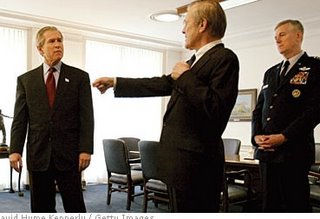The moral dilemma

... The moral dilemma is as old as the republic.
When does a military officer stand up to—and push back against—his civilian masters? And when does he just salute and say, "Can do, sir"?
It's a question of enormous consequence for a democracy with the world's most powerful military.
The balance between the civilian and military is precarious. The model may be Lincoln, firing his commanders until he found one (Ulysses S. Grant) who would fight. But the modern reality is messier. It is generally forgotten that Franklin Roosevelt rejected the recommendation of his sainted Army Chief of Staff Gen. George C. Marshall to invade Europe in 1942—which would have been a fiasco. Harry Truman was widely vilified for—wisely—recalling the great Gen. Douglas A. MacArthur when MacArthur wanted to widen the Korean War by attacking China. On the other hand, Lyndon Johnson overreached when he stayed up at night picking bombing targets during the Vietnam War.
In 1997, Army Gen. Hugh Shelton, then chairman of the Joint Chiefs of Staff, assigned the top brass to read "Dereliction of Duty," a classic study accusing Vietnam-era generals of failing to stand up to their civilian bosses...
(http://www.msnbc.msn.com/id/12335719/site/newsweek/)
crsdovale


0 Comments:
Enviar um comentário
<< Home